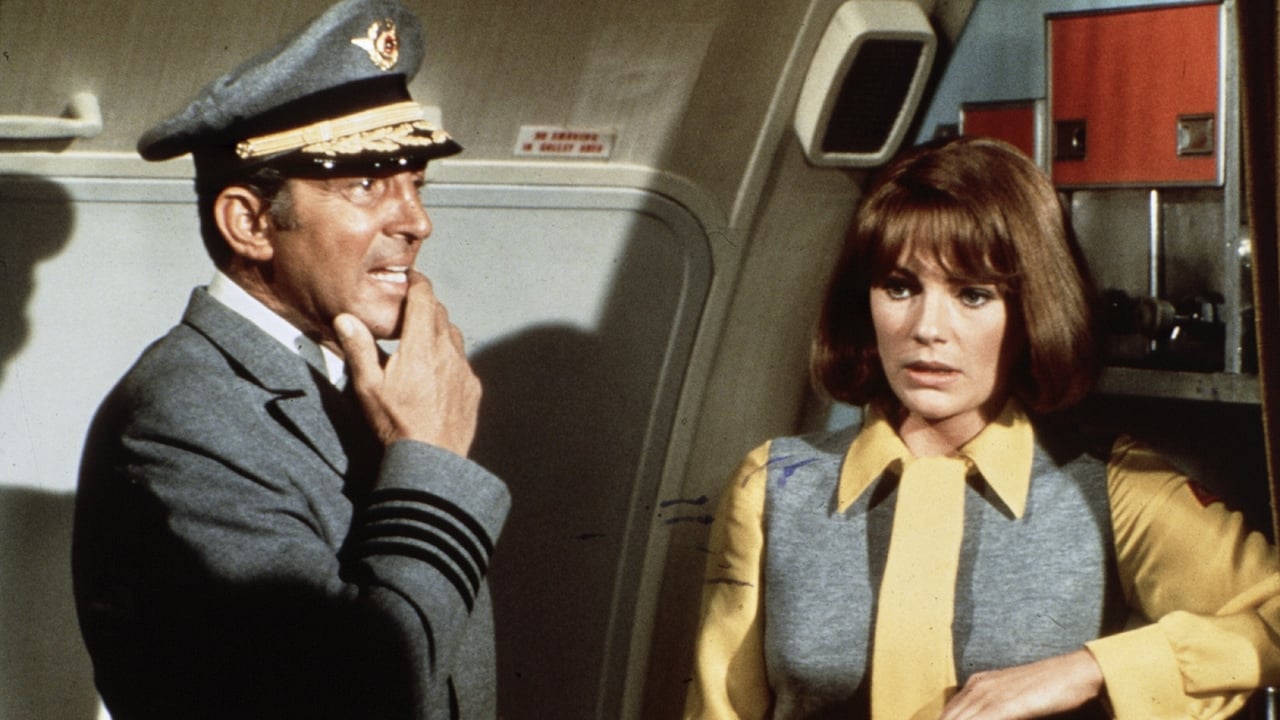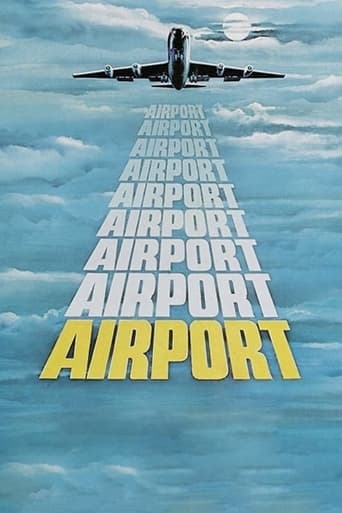



The performances transcend the film's tropes, grounding it in characters that feel more complete than this subgenre often produces.
View MoreIt isn't all that great, actually. Really cheesy and very predicable of how certain scenes are gonna turn play out. However, I guess that's the charm of it all, because I would consider this one of my guilty pleasures.
View MoreGreat example of an old-fashioned, pure-at-heart escapist event movie that doesn't pretend to be anything that it's not and has boat loads of fun being its own ludicrous self.
View MoreIt's a good bad... and worth a popcorn matinée. While it's easy to lament what could have been...
View MoreAn airport struggles to remain open during the worst snowstorm in 25 year.Mel Bakersfield is the airport manager who must not only fight the weather, but his pilot/playboy brother-in-law, his divorce seeking wife, a deranged man with a bomb, a plane stuck in the mud and blocking the main runway, and a stowaway........among other things...You can define disaster in many ways, Many will see this film as a straightforward 'Plane is under attack movie' in the same vein as something like the much later 'Executive Decision', but there is so much more to this film than just a bomb on a plane.The disaster could be crumbling relationships, fear of losing a career, fear of not making somewhere on time, just usual everyday things that could cause 'disaster' in someones routine if things don't go to plan for them.This mainly lies on the shoulders of Burt Lancaster, whom is either sitting in an office listening to peers quite concerned, or putting on a lovely looking warm jacket and going out to the runway to look at a stalled plane.On the other hand, we have the dashing crooner Dean Martin suffering the disaster of his hair going slightly off style for a couple of minutes, or trying to deal with the 'disaster' of falling in love with someone over half his age and fathering her unborn child.The problem is, if you saw Airplane! before this, you cannot take the film seriously, and even more so if you've seen the more over the top disaster films that followed this.It has a plethora of sub-plots going on, from a know it all child, to a hilarious old woman who hitches free rides and feigns illness almost every act in the film.It's just too serious for it's own good, and there are a few passengers on board you would gladly punch in the face if you were on the same flight.The film does inject an element of humour into the script in the final third, but it's pretty blasphemous, as it consists of a Nun chugging a bottle of spirit, and a Father slapping a delusional passenger.Kennedy is the best thing about the film, and it's no wonder they bought him back for the three sequels.It's the cinematic equivalent of the picture of food you see on a menu in a chain restaurant, it looks grand, but the finished product is far less palatable.
View MoreAs Hitchcock's reign was coming to an end, a new sub-genre popped out of nowhere to become the main provider of thrills for the decade to come. In 1970, "Airport", George Seaton's star- studded Best Picture nominee paved the runway to the disaster genre.From the air to the fire, water to animals living in it, these cinematic instances where mother Nature took the bad role, seemed to fulfill a masochistic craving for mass destruction or their impending doom, and the closer to the audience the characters were, the more heart-pounding the experience was. By the end of the 70's, Lucas, Scott and Spielberg had already reshaped the thrillers, relocating the settings to space or more "exotic" locations, taking viewers back to the outmoded charm of 40's/50's B-movies. And in 1980, the final nail of the disaster's coffin was the spoof movie's "Airplane!": no one would ever take any disaster film seriously after that. But at the dawn of the 70's, while America was caught between the polarizing effects of the Vietnam War and the disillusion of the economical crisis, escapism could only be conveyed by life-threatening situations with a fistful of survivors. Sometimes, there would be more... and on that level "Airport", as the starter, went pretty easy with the protagonists, but what it did and what it should be remembered for is to have defined a sub-genre, one that culminated with "Jaws" and ended with "The China Syndrome". These movies would all obey the same codes: a cast full of big names was the primal requirement and there would be as many stars as intertwining stories and subplots, all affected by a disaster that would either change or terminate their lives. This mix of spectacular terror and mundane banality give these films a unique flavor: you could root for these people because they dealt with similar problems than yours, but because some of them would remind you of a few enemies, you wouldn't mind watching them falling to their death, being drown or crushed. Did I say masochistic? I guess there are some sadistic impulses. And when I started "Airport", I wanted these little guilty impulses of mine to be satisfied; there were a few characters that were made so unlikable I was already jumping at the idea of seeing them sucked out of a hole in the aircraft or having Karma backfiring at them in a way or another. But nothing happened.As a matter of fact, nothing EVER happened, nothing thrilling that could fit in a ten-minute montage. The film is just an assemblage of marital arguments, characters expositions, and promising build-ups without any emotional reward whatsoever. I enjoyed the campiness of these people washing their dirty linen in public; it works on the "so bad it's good" level. Charlton Heston and Ava Gardner in "Earthquake" or that macho duel between McQueen and Newman in "Towering Inferno", were delightfully over the top, but they belonged to movies that could backup the hammy acting with great thrills. Not every film could aspire to be a powerful drama à la "Jaws" or "China Syndrome" but disaster movies were always great thrillers in their own right.And I really expected "Airport", as the one that defined all these archetypes, to be slightly better than its predecessors. As far as acting went, I expected nothing but it was fun to see Burt Lancaster and Dean Martin approach their stories as if their lives depended on it, how overly macho George Kennedy did his 'chief mechanic' shtick and how nervous Van Helfin was and more ridiculous the fact that no one suspected him. But this is nothing compared to the female roles: Helen Hayes' old innocent lady's routine act, the compassionate mistresses played by Jean Seberg and Jacqueline Bisset, and the selfish pompous wife asking for a divorce and giving her husband a free pass for infidelity. These subplots made me wonder what statement about marriage the film wanted to deliver and why did they think we would care enough to see THAT occupying more room than the plane problem.Halfway through the film, I had to check my watch, the plane hadn't even taken off and I spent more time trying to figure out what was going, especially with all these annoying split screens and phone calls. So there's a storm, snow everywhere, planes are blocked, people complain about pollution, the Captain cheat his wife, the manager spent too much time at work, a plane is blocking the runway, and a man wants to explode a bomb so his wife can get the life insurance. I'm pretty sure this could have been handled in less than one hour so we can get directly to the plane part. Once Helfin finally explodes -and off-screen for all that- it's all about landing the plane, and guess what? The plane lands but there's no suspense whatsoever injected in this, only a race against the clock. To the film's defense, in a plane, it's either everyone dies or everyone survives, so the film was victim of its very premise and didn't convey this life-threatening Adrenalin effect. The only character that brings some deep humanity is Maureen Stapleton but she's so seldom seen in the film that it's not enough. Watching "Airport" under the scope of its influence made me realize how infinitely better the successors were and the day after, they aired "Die Hard 2" on TV, well, I know "Airport" tried to pass as realistic drama and "Die Hard 2" asks a bit too much on the suspension of disbelief department, but I'd take that airport-themed movie over "Airport" any time. "Airport" is enjoyable to some degree, the campy acting and the whole old-fashioned treatment gives a sort of involuntary qualities, but what is unforgivable is that is fails to provide the basic element of a thriller: thrills!
View MoreI guess out of all the 70's "Disaster Movies" Airport is about the most watchable (along with "Towering Inferno") Both have their boring parts and this one some pretty corny dialogue (These days that has morphed into banal so not a lot of change there.) The best feature of this movie is the casting of a real professional actor in Burt Lancaster, I don't like all of his movies but he never gave a poor performance in his life. There is the usual line up of "veterans" who have all seen better days. I'm totally mystified by the Oscar for Helen Hayes as best supporting actress, there is nothing special about her acting and in fact her character is Hollywood at it's most corny. Worth seeing through but don't expect anything very special or you might be very disappointed.
View MoreSo it was the start of 70's where special effect guys were still struggling to give out the best.This one is quite enjoyable although special effects were sought of cheesy.It lacks the glamor of big budget with mediocre sound track.Star cast was promising which delivers as expected.Sometimes dialogs feels like you are watching a 50's movie only in color which i suppose due to the fact that book came in 1958. The old stowed away lady provided the much needed comic relief.Only thing that got me was the post marital relationship was taken as too casual.In the end everyone gets along with the ladies and not with their spouses. Go watch this flick you will never get bored.
View More